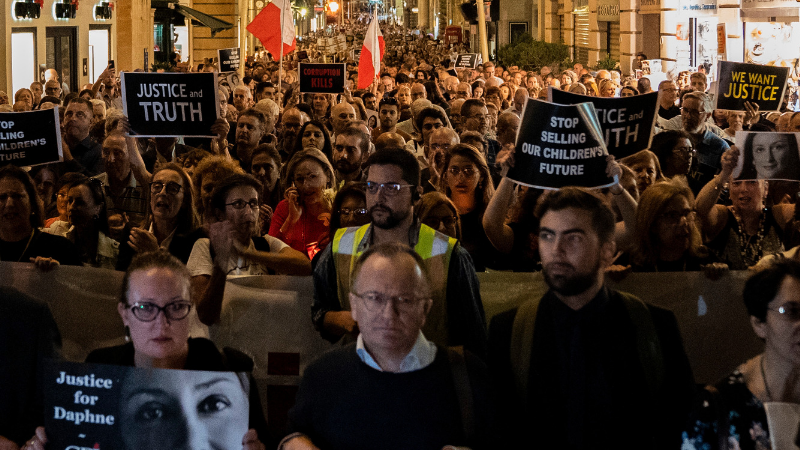The Maltese government cannot redeem itself by arresting three hitmen accused of murdering journalist Daphne Caruana Galizia, her son Matthew told a debate organised by the European People’s Party (EPP) in the European Parliament in Brussels.
The Maltese government cannot declare the case of his mother’s murder closed by arresting three men accused of carrying out the murder, he said on Thursday.
Matthew Caruana Galizia – a Pulitzer prize-winning journalist himself – called on political parties in the European Parliament to come together and legislate to prevent murders of investigative journalists and improve the situation on corruption and the rule of law in Europe.
Caruana Galizia said his mother was exposing government corruption and asked “what are we going to do about that? Who is going to continue their work? Are they also going to die?”
He said Europe needs to confront corruption which leads to the murder of journalists “head-on” describing it a fundamental principle on which all parties should agree upon.
https://www.facebook.com/IlGrupptalPartitPopolariEwropew/videos/243675046304579/
“My family and I want to use this opportunity to call for cross-party consensus on the rule of law and against corruption, on how to deal with threats to journalists and the murder of journalists. Parties should not rally behind governments simply because it is a member of their party. Parties should commit not to undermine each other and follow usual alliances. They should make an example of a murder and a threat and say ‘on this we are united’.”
Investigative journalists can only have immediate consequences on the corrupt when press freedom is strong, “but also when law enforcement authorities are independent from central government and private interests.”
Caruana Galizia said that in countries who only uphold press freedom in appearance and where investigations are influenced by government and private interests, journalists will still be murdered.
“In countries like Malta there is no will or capacity to prosecute corrupt figures that journalists like my mother exposed,” he said, adding that “the full force of the state is not brought down on the corrupt individuals that are subjects of our stories, but is brought down on journalists and whistleblowers who bring corruption to light.”
Caruana Galizia added that after the publication of the Panama Papers in some countries banks were raided and Prime Ministers were forced out of office, but in Malta his mother was hit with vexatious lawsuits, financial threats, targeted tax investigations and physical harassment before she was murdered.
Investigative journalism and the fight against corruption cannot be separated, Caruana Galizia argued in his brief intervention.
“You cannot compartmentalise press freedom and corruption, they’re not two separate issues. You cannot call for one and turn a blind eye to the other,” he said, adding the two are completely interlinked and complementary,” Caruana Galizia said.
Noting that two-thirds of journalists murdered since 1992 were killed for covering politics and corruption and not because they were working in war zones, Caruana Galizia said journalists are murdered in countries which fail to investigate, prosecute and deter corruption.
“The murder of journalists betrays institutional failure and the extreme levels of corruption, there is no other reason for it.”
While working on Panama Papers, Caruana Galizia said he realised how the system of global crime and corruption works, and how companies like Mossack Fonseca provide an essential service to corrupt actors worldwide.
“This had become a hidden underlying system that none of us were seeing but that really held up global systems of crime and corruption.
Caruana Galizia said the publication of the Panama Papers triggered hundreds of judicial proceedings worldwide, high-profile resignations, $500 billion in lost tax revenue was collected and a broad public debate on anti-money laundering rules.
“I think this emboldened European regulators and this is for me one of the best arguments if any were needed for investigative journalism and its importance across the world.”
The debate, entitled ‘The fight for the truth’ was also addressed by a number of other journalists, MEPs and press freedom activists.
Spanish journalist and former managing editor of El País Daniel Alandete said journalists don’t control distribution of information but social media does. He said social media is used by regimes and governments all over the world as a weapon of propaganda and is often used to attack journalists who expose wrongdoings.
Maltese MEP David Casa said investigative journalism is a prerequisite to a fully functioning democracy and urged the EPP to commit itself to introduce anti-SLAPP legislation after next year’s European elections
He said when a journalist pays the full prize for standing up for European principles they must not only be honoured but also their work must be continued.
While saying that Daphne Caruana Galizia’s voice lives on through the work carried out by The Daphne Project and other courageous journalists, Casa said the European Parliament must introduce legislation which protects journalists.
“If the objective was to silence her (Caruana Galizia), they have failed,” he said, adding that while the European Parliament cannot do much to prevent the actual murder of journalists it can legislate against attempts to silence them.













